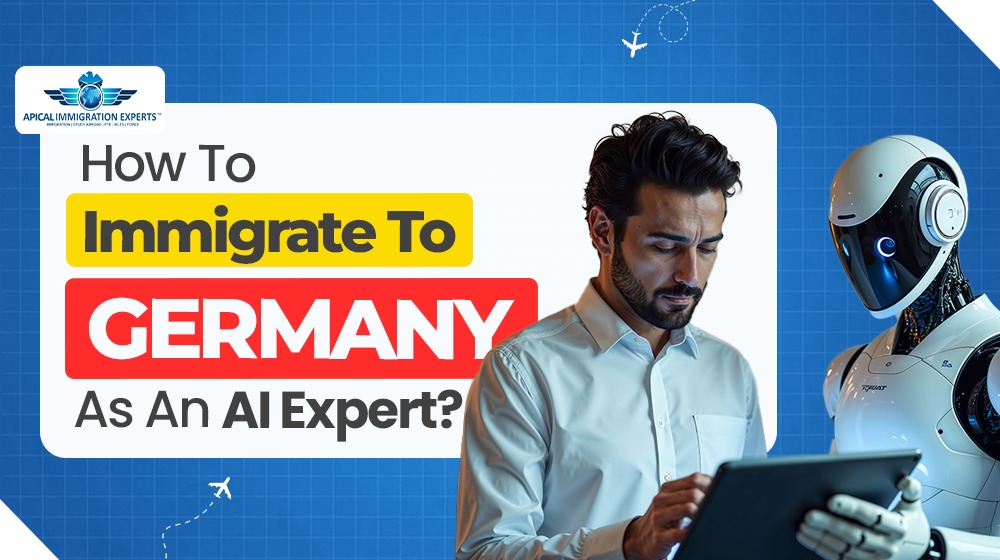Germany has emerged as one of the top destinations for technology professionals, especially in the field of Artificial Intelligence (AI).
With its thriving tech ecosystem, research-driven environment, and strong government support for innovation, Germany offers AI experts excellent career opportunities.
If you’re considering making Germany your professional home, here’s a detailed guide on how to immigrate as an AI specialist.
Why Germany is Ideal for AI Experts
Germany is home to leading AI research institutions, top universities, and a booming tech startup ecosystem. The government has launched several initiatives, such as the “AI Made in Germany” strategy, aiming to position the country as a global AI leader. For AI professionals, this means:
- High demand for AI talent across industries like automotive, healthcare, finance, and robotics.
- Competitive salaries and attractive benefits for skilled specialists.
- Opportunities in research and development, collaborating with universities and tech hubs.
- Pathways to permanent residency through the Blue Card and other work visas.
Step 1: Check Your Eligibility
Before starting the immigration process, ensure you meet the requirements to work in Germany as an AI expert:
- Educational Background: A recognized university degree in Computer Science, Data Science, AI, Machine Learning, or related fields.
- Work Experience: Several years of relevant experience in AI development, data modeling, or machine learning projects.
- Language Skills: While many tech jobs require only English, learning basic German will improve integration and career prospects.
Step 2: Explore Visa Options
Germany offers multiple pathways for skilled professionals:
- EU Blue Card
The EU Blue Card is designed for highly skilled non-EU workers. To qualify:- You must have a university degree recognized in Germany.
- You need a job offer with a minimum salary (approximately €58,400/year in 2025; lower for shortage occupations like IT and AI).
- The card is valid for 4 years and can lead to permanent residency.
- Job Seeker Visa
If you don’t have a job offer yet, Germany allows you to enter the country with a Job Seeker Visa:- Valid for 6 months, giving you time to search for employment.
- Requires proof of funds to support yourself and relevant qualifications.
- Research or Freelance Visa
AI researchers or consultants can apply for research or freelance visas if affiliated with German institutions or offering AI consultancy services.
Step 3: Secure a Job in Germany
While some visas allow entry without a job, securing a position beforehand simplifies the process. Here’s how to find AI opportunities:
- Job Portals: LinkedIn Germany, StepStone, Indeed.de, and XING.
- Research Institutions: Max Planck Institute, Fraunhofer Society, and German universities often hire AI researchers.
- Tech Companies and Startups: SAP, Siemens, BMW, Bosch, and AI-focused startups frequently seek AI engineers.
- Networking: Attend AI conferences, webinars, and tech meetups in Germany.
Recommended Read: How to Find a Job in Germany with the Opportunity Card in Hand?
Step 4: Apply for Your Visa
Once you have a job offer or are eligible for a visa:
- Prepare Documents:
- Valid passport
- Job offer letter or employment contract
- Proof of qualifications (degree certificates, transcripts)
- CV/resume
- Proof of health insurance
- Proof of financial means (for Job Seeker Visa)
- Submit Application:
- Apply at the German embassy or consulate in your country.
- Pay the visa fee (around €75 for most work visas).
- Attend Interview: Some applications may require an in-person interview.
Processing usually takes 6–12 weeks, so plan accordingly.
Step 5: Relocate and Integrate
After your visa is approved:
- Register Your Residence at the local Bürgeramt (residents’ registration office).
- Open a German Bank Account for salary and payments.
- Apply for Social Security to contribute to health insurance, pension, and unemployment benefits.
- Continue Learning German to enhance career growth and daily life integration.
Step 6: Path to Permanent Residency
AI professionals on the Blue Card can apply for permanent residency after 33 months if you have basic German proficiency (or 21 months if fluent). This opens doors for family reunification and long-term stability in Germany.
Tips for Success
- Highlight your AI projects on GitHub, Kaggle, or portfolios to impress employers.
- Stay updated on Germany’s AI strategy and emerging sectors.
- Consider research collaborations or internships in Germany before a full-time role.
- Connect with AI communities and German tech hubs for networking.
Conclusion
Germany offers an exciting landscape for AI experts seeking international opportunities. With a clear strategy—checking eligibility, securing the right visa, finding a suitable role, and integrating successfully—you can establish a rewarding career while contributing to Germany’s innovation ecosystem.
Germany is not just a destination; it’s a platform to grow as a world-class AI professional. Start your journey today!
- Email: info@immigrationxperts.com
- Call us: +91-9999467686, +91-8447-696555






